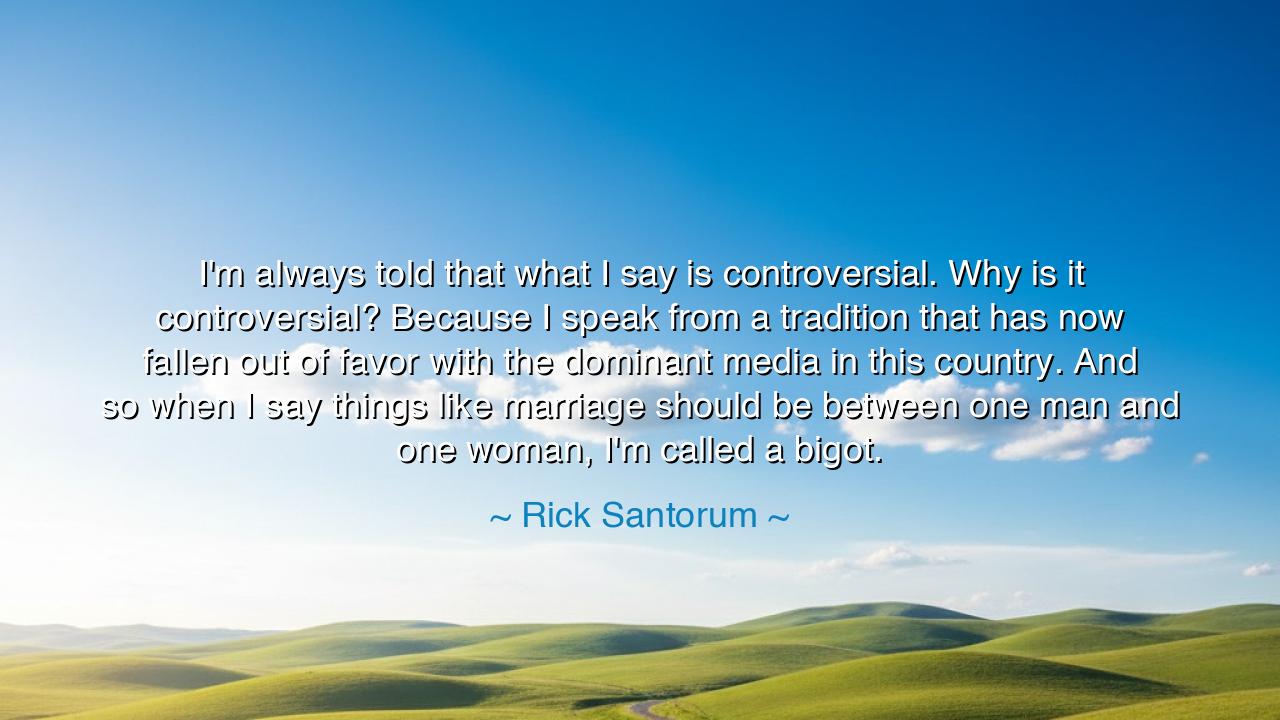
I'm always told that what I say is controversial. Why is it
I'm always told that what I say is controversial. Why is it controversial? Because I speak from a tradition that has now fallen out of favor with the dominant media in this country. And so when I say things like marriage should be between one man and one woman, I'm called a bigot.






"I'm always told that what I say is controversial. Why is it controversial? Because I speak from a tradition that has now fallen out of favor with the dominant media in this country. And so when I say things like marriage should be between one man and one woman, I'm called a bigot." These words from Rick Santorum speak to a deep and timeless tension that has shaped human societies for millennia—the clash between tradition and progress, between established norms and the evolving currents of social change. Santorum’s statement is a reflection on how deeply rooted beliefs can become the subject of criticism when they stand in contrast to the prevailing opinions of the day. His words echo the conflict between personal conviction and societal transformation, a conflict that has played out throughout history in every culture and society.
In the ancient world, this struggle was no less evident. Consider the great philosopher Socrates, who, much like Santorum, was reviled for his traditional beliefs. He stood in opposition to the prevailing wisdom of his time, questioning the values of Athens and challenging the assumptions held by the public. Socrates’ teachings, which emphasized the pursuit of truth and virtue, often clashed with the popular opinions of the day, and his willingness to speak truth despite the personal cost led to his trial and execution. Like Santorum, Socrates faced the anger of those who adhered to the dominant ideology and sought to suppress his challenging perspective. But Socrates, ever steadfast, knew that true wisdom often comes not from following the crowd but from standing firm in one's convictions, even when those convictions are out of step with the prevailing culture.
In more modern times, consider the struggle of Martin Luther, the great reformer who challenged the Catholic Church during the Reformation. His 95 Theses rejected many of the Church’s teachings, and in doing so, he became a lightning rod for criticism. Luther’s ideas were considered radical, controversial, and even heretical by the authorities of his time. Yet, he too stood firm, believing that the truth of his convictions was worth the opposition of the dominant powers. Luther’s fight was not simply about religion; it was about the right to speak openly, to challenge the status quo, and to demand that ideas be evaluated based on their merit rather than their alignment with prevailing ideologies. Santorum, in his own way, echoes this struggle—standing up for what he perceives to be a traditional value that has come under fire by those who control the discourse of the present day.
This tension between tradition and progress has always been a powerful force in shaping the course of human history. The tension between those who wish to preserve the past and those who wish to embrace change is a recurring theme that has brought both great advances and conflicts. Santorum’s position on marriage reflects a desire to hold fast to traditional values, a desire that has always existed in human societies. Yet, as society evolves, those who advocate for tradition often find themselves at odds with new ideas, ideas that challenge the norms that once defined the collective identity.
The challenge Santorum faces is one that many of us encounter in different forms: the tension between conviction and the pressure to conform. To live with integrity in the face of a society that often views traditional beliefs as outdated or even offensive requires great courage. It requires a deep understanding that personal conviction is not always popular and that standing firm in one’s beliefs may come with personal sacrifice. But it is through these struggles that we come to understand the value of truth—the truth that is often buried beneath the surface of cultural trends and the ever-shifting tides of public opinion.
The lesson here is clear: we must each find the balance between tradition and progress, between the values we hold dear and the changing world around us. Santorum’s words remind us that the voice of tradition is not always heard, and that those who speak from it are often misunderstood, even vilified. Yet, history shows that many of the greatest advances in society have come from those who were willing to stand in opposition to the dominant forces of their time. Whether you agree with Santorum or not, his stance calls for deep reflection: are you willing to stand firm in your beliefs, even when they are at odds with the mainstream, and do you have the courage to speak your truth when it is not popular?
So, I urge you to reflect on this in your own life: What beliefs do you hold that may be controversial? Are you ready to stand by them even when the world pushes against them? True wisdom comes not from following the current of public opinion, but from being rooted in your convictions, having the strength to question the popular views, and the courage to speak what you believe, even when it is difficult. May you find the strength to balance the call of tradition with the demands of progress, knowing that in doing so, you will shape the world in ways that align with your deepest truths.






AAdministratorAdministrator
Welcome, honored guests. Please leave a comment, we will respond soon